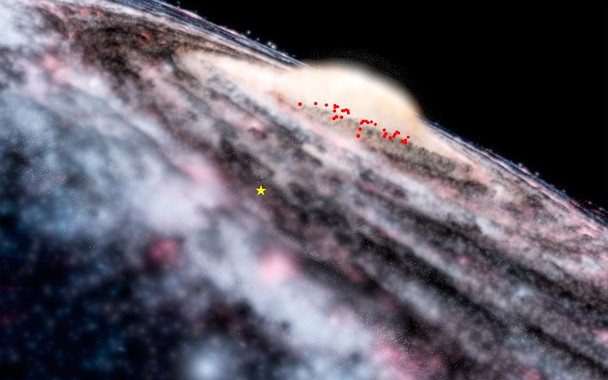Zientzia hedabideetan
-

The chemistry that could feed life within Saturn’s moon Enceladus: study gives clue ahead of flyby
Saturn’s 502km-diameter icy moon Enceladus has fascinated scientists since it was first seen up close by NASA’s Voyager probes in the 1980s. The moon is venting plumes of ice particles […]
-

Las cefeidas ayudan a descubrir un nuevo componente de la Vía Láctea
Mientras cartografiaban un tipo de estrellas que varían de brillo, llamadas cefeidas, un equipo de astrónomos ha encontrado un disco de estrellas jóvenes ocultas tras las gruesas nubes de polvo […]
-

Saguzar hatz-luzeak desberdin arrantzatzen ditu intsektuak eta arrainak
Saguzar hatz-luzeak arrainak eta intsektuak nola bereizten dituen eta harrapakin-mota bakoitzerako ekokokapen-pultsuak eta arrantza-teknika nola egokitzen dituen argitu du EHUko ikertzaile-talde batek.
-

No, usted no debe tener miedo a comer carne
¿El riesgo de consumir carne procesada es equivalente al de fumar o tomar el sol sin protección? Definitivamente NO, y la OMS es contundente en este aspecto. Este estudio “NO […]
-

The Futility of Modern Fears
From an evolutionary perspective, our fear instincts make a lot of sense. But in our cozy modern-day lives, fear sometimes seems to do more harm than good.
-

Ocean’s hidden green plankton revealed by fixing glitch in model
Assumptions about the green colour of microscopic organisms have led to overestimates about their decline as oceans warm
-

Identificados los microorganismos en la Estación Espacial Internacional
Un análisis de las moléculas de polvo de la Estación Espacial Internacional ha permitido conocer los agentes bacterianos con los que conviven los astronautas en el espacio, y compararlos con […]
-

Greenland Is Melting Away
A network of thousands of rivers at the front line of climate change.
-

El misterio de por qué se están volviendo más efectivos los placebos
Cuando se sacan nuevos medicamentos al mercado, ensayos clínicos determinan si su efecto es significativamente mayor que el de otras pastillas sin ningún efecto, conocidas como “placebos”. Distintas investigaciones muestran […]
